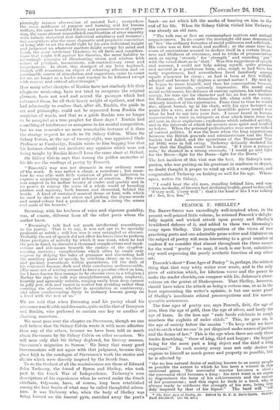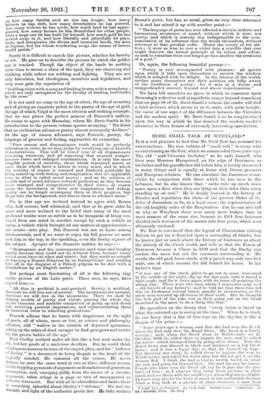PEACOCK V. SHELLEY.*
Ma. BaErr-Ssnru was exceedingly well-inspired when, in the present well-printed little volume, he reissued Peacock's delight- fully impish and wicked attack upon poetry and Shelley's bewildered defence of it, and added to these two Browning's essay upon Shelley. This juxtaposition of the views of two practising poets and one admirable prose writer and liftdrateur on the subject of poetry will seem interesting to a great number of readers if we consider that almost throughout the three essays for the word " poetry " we may, if such is our bent, substitute any word expressing the purely aesthetic function of any other art.
Peacock's short" Four Ages of Poetry" is, perhaps, the wittiest thing that that very witty writer ever wrote, and is the only piece of criticism which, for hilarious verve and the power to make the reader chuckle, can compare with Dr. Johnson's obser- vations on the genius of Shakespeare. That Shelley, however, should have taken the attack as being a serious one, or as in the least representing the writer's opinion, is but one more proof of Shelley's inordinate ethical preoccupations and his uncon- querable seriousness.
The four ages of poetry are, says Peacock, first, the ago of
iron, then the age of gold, then the age of silver, and lastly the age of brass. In the iron age " rude bards celebrate in rough numbers the exploits of ruder chiefs." This, he goes on, is the age of society before the maxim " To keep what we have and to catch what we can' is yet disguised under names of justice and the forms of law." This is the ago when there are only three
trades flourishing, " those of king, thief and beggar : the beggar being for the most part a king deject and the thief a king
expectant." In such society every man not only desires to engross to himself as much power and property as possible, but he is affected by " the no less natural desire of making known to as many peep!e as possible the extent to which he has been a winner in this universal game. The successful warrior becomes a chief ; the successful chief becomes a king : his next want is an organ to disseminate the fame of his achievements and the extent of his possessions ; and this organ he finds in a bard, who Is always ready to celebrate the strength of his arm, being "first duly inspired by that of his liquor." The bard will " tell • The Four Agee of Poetry, etc. Edited by B. F. B. Brett-Smith. Oxford: Basil Blackwell. 148. Gd. net.1 us how many battles such an one has fought., how many helmets he has cleft, how many breastplates he has pierced, yew many widows he has made, how much land he has appro- priated, how many houses he has demolished for other people, what a large one he has built for himself, how much gold he has stowed away in it, and how liberally and plentifully he pays, feeds, and intoxicates the divine and immortal bards, the sons of Jupiter, but for whose everlasting songs the names of heroes would perish."
Surely it is difficult to match this picture, whether for brevity or wit. He goes on to describe the process by which the golden age is reached. Though the object of the bards be nothing more than to secure a share of the spoil, they are observing and thinking while others are robbing and fighting. They are not only historians, but theologians, moralists and legislators, and very soon gain the reputation of
" building cities with a song and leading brutes with a symphony ; which are only metaphors for the faculty of leading multitudes by the nose."
It is not until we come to the age of silver, the age of recasting and of giving an exquisite polish to the poetry of the age of gold, the age of which Virgil is the most obvious and striking example, that we can pierce the perfect armour .of Peacock's raillery. He seems to agree with Macaulay, whom Mr. Brett-Smith in his introduction to the present volume quotes as saying, " We think
that as civilization advances poetry almost necessarily declines." As the age of reason advances, says Peacock, poetry, the language of passion and feeling, approaches its extinction.
" Pure reason and dispassionate truth would be perfectly ridiculous in verse, as we may judge by versifying one of Euclid's demonstrations. This will be found true of all dispassionate reasoning whatever, and all reasoning that requires compre- hensive views and enlarged combinations. It is only the more tangible points of morality, those which command assent at once, those which have a mirror in every mind, and in which the severity of reason is warmed and rendered palatable by being mixed up with feeling and.imagination, that are applicable even to what is called moral poetry : and as the sciences of morals and of mind advance towards perfection, as they become more enlarged and comprehensive in their views, as reason gains the ascendancy in thorn over imagination and feeling, poetry can no longer accompany them in their progress, but drops into the background, and leaves them to advance alone."
We in this age are inclined instead to agree with Ronan who, half serious, half whimsical, said that as he grew older ho more and more inclined to the belief that many of the most profound truths were so subtle as to be incapable of being con- veyed from one mind to another except by such a vehicle as opera, a vehicle which brought all our sources of apprehension— our senses—into play. But Peacock was not at home among fundamentals, and if we want to enjoy his full powers we must seek him in the top, in the sparkling, even the frothy regions of his subject. Apropos of the dramatic unities, he says :- " Shakespeare and his contemporaries used time and locality merely because they could not do without them, because every action must have its when and where : but they made no scruple of deposing a Roman Emperor by an Italian Count and sending him off in the disguise of a French pilgrim to be shot with a blunderbuss by an English archer."
But perhaps most fascinating of all is the following tiny satiric picture of the Lake poets. These men, he says, have argued thus :- " All that is artificial is anti-poetical. Society is artificial, therefore we will live out of society. The mountains are natural, therefore we will live in the mountains. There we shall be shining models of purity and virtue, passing the whole day in the innocent and amiable occupation of going up and down hill, receiving poetical impressions, and communicating them in immortal verse to admiring generations."
Peacock affirms that he burns with impatience at the sight of poets, all of whom, more or less, as science and philosophy advance, still " wallow in the rubbish of departed ignorance, raking up the ashes of dead savages to find gew-gaws and rattles for the grown babies of the age."
Poor Shelley writhed under all this like a lost soul under the sly, red-hot prods of a malicious devilkin. But he could think of adequate answers to none of the impish jibes, and his " Defence of Poetry " is a document to bring despair to the heart of the logically minded. He commits all the crimes. Ho never defines, he uses the same word in two or three different senses, builds toppling pyramids of argument on foundations of gratuitous assumption, and, emerging giddy from the mazes of a circular argument, takes refuge in a. page or two of unsupported ex cathedra statement. But with all its absurdities and faults there LS something splendid about Shelley's "defence." We feel the warmth and light of the authentic poetic fire. He fully realizes
Renan's point, but has, as usual, given no very clear utterance to it and has mixed it up with another point:
" The language of poets has ever affected a certain uniform and harmonious recurrence of sound, without which it were not poetry, and which is scarcely less indispensable to the com- munication of its influence than the wortrntremselves, without reference to that peculiar order. Hence the vanity of tea sta- tion ; it were as wise to cast a violet into a crucible that you might discover the formal principle of its colour and odour, as seek to transfuse from one language into another the creations of a poet."
Or, again, the following beautiful passage :-
" Poetry is ever accompanied with pleasure : all spirits upon which it falls open themselves to receive the wisdom which is mingled with its delight. In the infancy of the world, neither poets themselves nor their auditors are fully aware of the excellence of poetry : for it acts in a divine and unapprehended manner, beyond and above consciousness."
We have left ourselves no space in which to comment upon Browning's reflective and sympathetic essays beyond.remarking that on page 63 of Mr. Brett-Smith's volume tho reader will find a brief sentence which seems to us to state, with great insight, the cause of one aspect of the difference between the Victorian and the modern spirit.. Mr. Brett-Smith is to be congratulated upon the way in which he has directed the modern reader's attention to three founts of extremely interesting speculation.











































 Previous page
Previous page